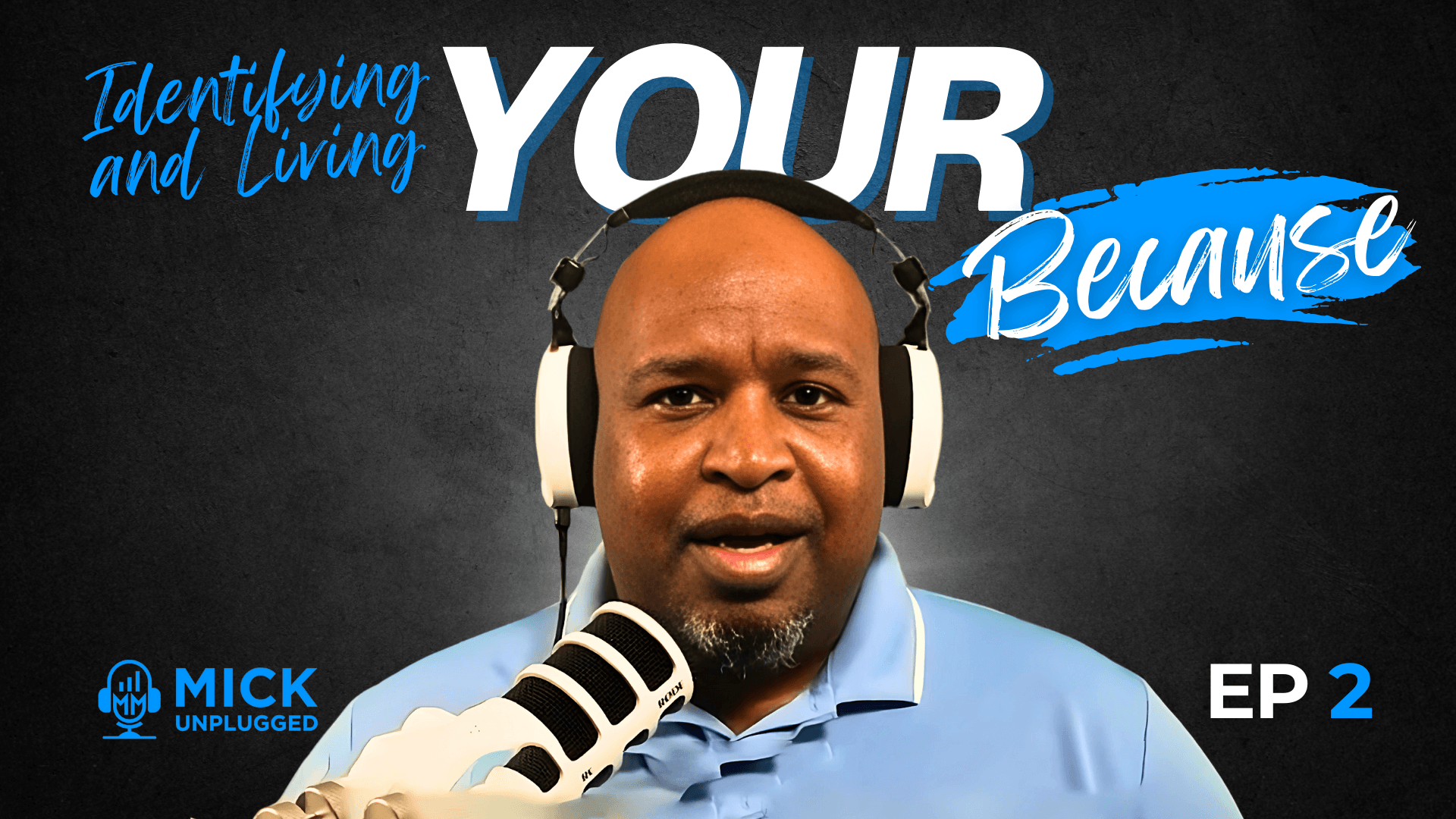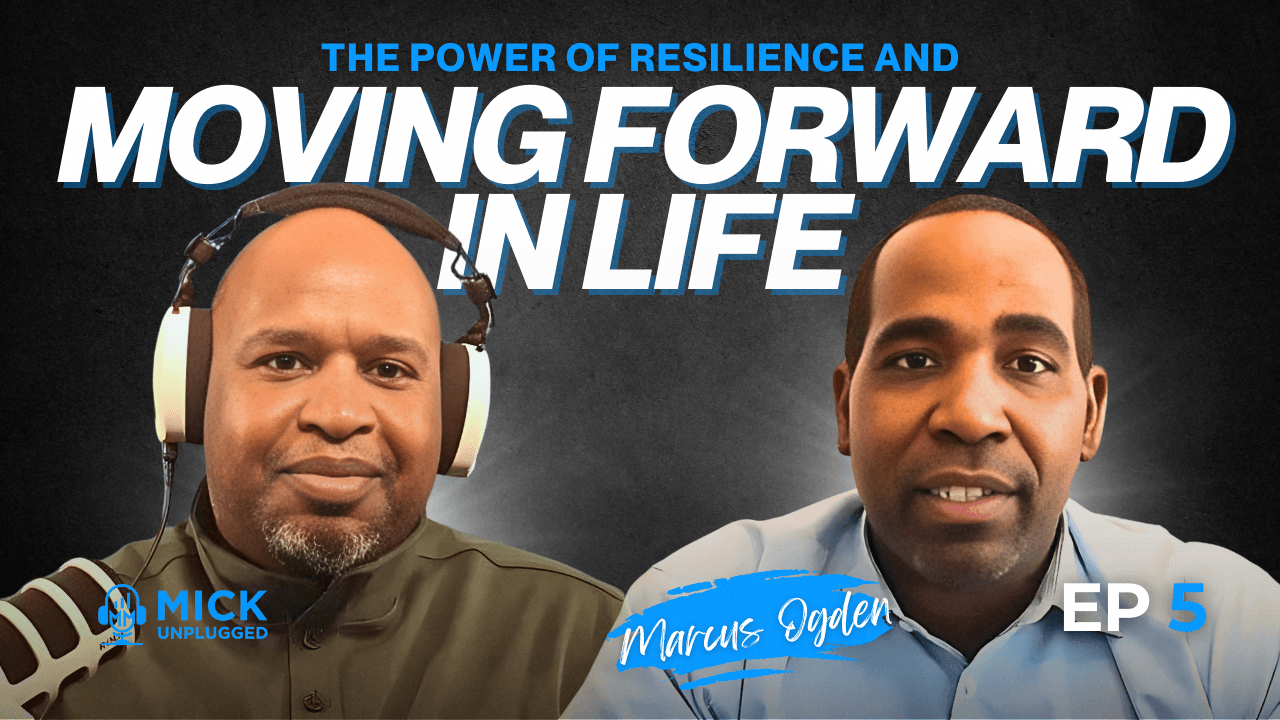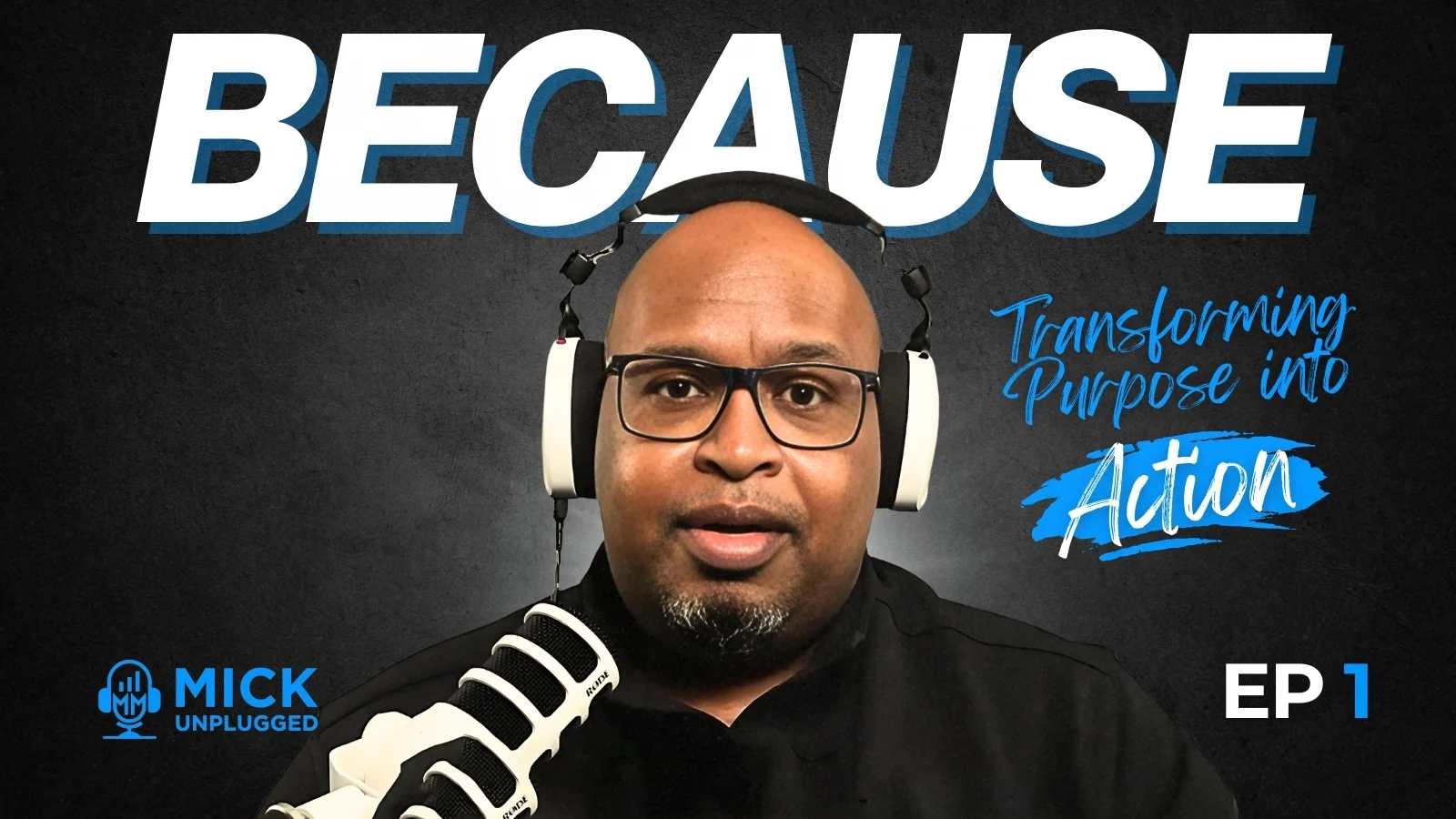[00:00:00] Podcast Intro: Are you ready to change your habits, sculpt your destiny, and light up your path to greatness? Welcome to the epicenter of transformation. This is Mic Unplugged. We’ll help you identify your because, so you can create a routine that’s not just productive, but powerful. You’ll embrace the art of evolution, adapt strategies to stay ahead of the game, and take a step toward the extraordinary.
[00:00:29] So let’s unleash your potential. Now, here’s Mick.
[00:00:34] Mick Hunt: Ladies and gentlemen, welcome to another exciting episode of Mick Unplugged and today’s exceptional guest is a renowned leadership and career coach who has dedicated his life to helping others find their purpose and achieve their professional goals.
[00:00:48] With the background and organizational leadership and a passion for personal development, he’s guided countless individuals to unlock their potential and lead with confidence as a speaker, author, and consultant, his insights and strategies have been transformative to many, please join me in welcoming the inspirational, the influential.
[00:01:08] Austin, Texas is on Dr. Benjamin Ritter. Dr. Ritter. How are you doing today, brother?
[00:01:13] Dr. Benjamin Ritter: Pretty good. Now anyone listening, this is your opportunity to clap. Like wherever you are in the world, just start clapping standing ovation. If you’re sitting down, not if you’re driving, people are going to look at you and be like, what are you doing?
[00:01:23] Like, well, you don’t know. Dr. Ritter is on Nick unplugged. So you got to listen to this episode.
[00:01:27] Mick Hunt: Absolutely. So, Dr. Ritter, I want to get into it, especially with your background, man. Like, I have an MBA with a track in organizational leadership, and I feel, you know, in the professional world, people don’t put enough emphasis on organizational leadership.
[00:01:43] Right? It’s like, you know, I’ve got a small business, even a midsize business. I’m supposed to have a manager. Maybe I should have a director, a VP, might even have a COO, CFO, VP of sales, but then collectively, how do I make those things work together? I’d love to hear your insights on your journey with leadership, but in particular, organizational leadership.
[00:02:02] Dr. Benjamin Ritter: Yeah, I’m personally passionate and I imagine you are too on how leaders grow specifically within organizations. And so people hear organizational leadership and they’re like, Oh, organizational behavior. I know what that is. No, it’s very much. People tend to focus on like the operations and the efficiencies of an organization, but they miss the people.
[00:02:19] I don’t know how you could focus on organizational behavior without actually focusing on organizational leadership. How are people. leading the individuals in your company to make sure that it’s effective and efficient, etc. I’m interested in this field very selfishly because I never want anyone to deal with a work environment or mentality towards work that I had.
[00:02:38] I was a very unhappy, burnt out, underutilized, blame forward. I blamed everyone around me for the situation that I was in professional. And because of that mindset, I did not take advantage of at least seven years of my career, at least not including what happened below before that. And so when I decided to go into this field, I didn’t have anyone I could count on or lean on or get support from.
[00:03:03] I did not have those positive relationships. I didn’t see. My authority is helpful. I didn’t really take advantage of the job that I was in. I see a lot of people miss out on that. And I didn’t know how to manage up and to create an environment that helped me grow and succeed in a company. And so my passion for organizational leadership is kind of this like, well, how do we just make places really great for people to work at?
[00:03:23] And then how do we help leaders do that for their teams?
[00:03:26] Mick Hunt: That’s amazing. And I’m going to share a stat because I just did a talk on this two weeks ago. I don’t know if the people listening know, and I want to hit on what you said, Dr. Ritter. 64 percent of people feel unfulfilled at work. They show up because it pays the bills and I’m just going to be as blunt as possible.
[00:03:43] So for 64 percent of your staff, they’re there because right now they don’t have another option. And I stress right now. Dr. Ritter, number one, what are your thoughts on that statistic?
[00:03:55] Dr. Benjamin Ritter: Yeah, and please call me Ben. It’s easier around the tongue when moving forwards. And I know I made like a very ego driven kind of first comment around applause, but really it was in jest.
[00:04:03] I’m at everyone’s level. No judgment towards anyone. I am who I am. You are who you are. We are equals in every way, shape or the form, even listeners. I mean, you have some strengths that I don’t know about. You could knock me out of the park. And so what I’m telling you is just what I’ve dedicated my current life to in this current job and career and feel free to disagree.
[00:04:20] But if you are working at a company about half to three fourths of the people that you meet are waiting for a better opportunity. And so they’re going into work every single day, wondering how to survive instead of really trying to figure out how to succeed. That’s kind of scary when you think about it.
[00:04:35] I was there. I’ve been there. I mean, sometimes I’m still there some days. How do I just get through today? Not how do I make today help me for tomorrow? Or how do I just enjoy today? How do I take pride in today? I have a book 2024. And one of the entries in there is about taking pride in your work. I made the mistake and every entry is from experience that I had.
[00:04:57] And I made the mistake of going into work, not caring about what I did and instead blaming my leaders and my job for not giving me the meaning and the satisfaction that I wanted. And I totally gave away my power. And we, every single day we go into work, we have the opportunity to say, how do I make today valuable for me?
[00:05:14] And almost 75 percent of people going into work right now are wondering, how do I get away with not working? That’s scary.
[00:05:21] Mick Hunt: That’s crazy. In your field, in your experience, what are some common challenges that people face in their career when it goes, I guess, towards fulfillment and how do you help them overcome those obstacles?
[00:05:34] Dr. Benjamin Ritter: Well, people that tend to come to work with me are generally unfulfilled, but at the same time they feel like they’re not doing enough. They feel like they’re underutilized. They don’t feel like they found where they’re going to excel. And where their home needs to be for their career, like half the time, maybe a third of the time.
[00:05:49] 100 percent true. The person’s isn’t a really, I’d say a third of the time in a negative environment. This person looks around them. This environment is not going to help them. It’s not aligned with the things that they actually want to do in life. And they need to maybe pivot or shift industries. That can happen.
[00:06:02] I’d actually say the majority of the time people are scarred by a previous work experience or a leader, or a belief about how they’re supposed to show up to work, or maybe they don’t have a lot of confidence. And so they let the needs of other people take over theirs. And so they have completely and utterly created a job for themselves that does not put their needs or career first.
[00:06:24] And so they say yes to things they shouldn’t say yes to. That means their boundaries and their time is spent in places that it doesn’t need to be. They think work is important, but they don’t really know what their priorities or expectations are. They have no true understanding of what they’re trying to work towards in terms of their career.
[00:06:39] And they put themselves in a work environment that isn’t really positive, or uplifting, or supportive, or has a certain level of mentorship. So we talk about this with self leadership. They don’t have clarity over their career, who they are. They don’t have confidence in themselves. And so that leads to a lot of issues.
[00:06:55] So they don’t actually set a direction for their career or stand up for what they need or speak up to potentially get the visibility they need with an organization. So they’re really just kind of sitting there and doing their job and just doing your job, doing a good job, doing an amazing job isn’t generally enough to help you get to where you need to be, especially when you’re burnt out and exhausted.
[00:07:12] And then they just put up with negativity. They don’t set boundaries. They allow themselves to be in a negative environment. They play the victim. And so their environment automatically becomes negative because you can’t create a positive environment when you see the world through negative lenses either.
[00:07:23] Mick Hunt: There’s so much that I want to unpack and unplug right here because this is gold. I want to start with you hit on something about confidence. And I’ve, again, followed you for a while. And I know one of the things that you talk about is confidence in leadership. So how do you help individuals build that trait?
[00:07:41] Dr. Benjamin Ritter: Ooh, confidence. If there’s one tray in the world that could probably create peace. No, I’m just kidding. And if we believed in ourselves and didn’t have to feel like we needed to prove ourselves or didn’t feel that we had to hold back our thoughts and beliefs because we’re worried about consequences. If we went into work each and every single day, knowing that we’d be okay, that we’d find another job, I would love to work in an environment like that competence is two main things.
[00:08:06] Really? It’s a belief in your own skills, which is just okay. You can go read a book, listen to a podcast, which a lot of people do not do, especially leaders when they doubt how great they are at leadership or they have a difficult employee. They don’t just type into their podcast app how to have a difficult conversation, which is, you know, Sometimes the easiest trick, but it’s belief in your skills and then belief in yourself and belief in yourself is probably the trump card.
[00:08:28] I mean if people are happy at work and they believe in themselves and generally they respect others like I don’t care how good you are at anything like if you’re happy go for it But generally I work with leaders that care very deeply about being better leaders and they do not believe in themselves Which is hilarious because generally people that come to hire a coach to get better at being a leader, probably pretty good leaders, unless they’ve been forced to go hire a coach because you care and you probably have a growth mindset.
[00:08:55] You believe that you can change. And generally that level of approach when it comes to leader overall, that human centric approach can be really powerful. So in terms of like confidence, people tend to act like their position. So if they don’t have confidence, they don’t act like the next position, which is what you need to do to be able to grow in your career.
[00:09:11] You are not a role. You are not your job. You are your skills and expertise. And if you can’t show up that way, you’re going to limit your own growth and potential. And then also if you are not confident and you don’t believe in yourself, you don’t know what you stand for and you don’t know what your priorities or expectations are.
[00:09:26] That’s if you ask for them because generally unconfident leaders do not ask for feedback. You end up doing everything and if you do everything, then you do nothing and people don’t really need a Swiss army knife. They need you to show up with the skills that energize you and will help the organization grow overall.
[00:09:40] Mick Hunt: No, that’s amazing. And the 2nd thing that I want to unplug that you talked about was negativity. And I have a friend who is on job number 3 in 2024. And I have this belief, Ben, and you know, you’re the professional, so I’m going to let you attack my belief, but I believe that negativity bleeds out, it bleeds up, it bleeds down.
[00:10:01] And if you’re a person that seeks or always finds negativity, maybe it’s a you issue or challenge, right? Like, if you ask people, tell me about your day or what was great about your day or what was good about your day, and the first two responses you get are the things that went wrong all day, every day.
[00:10:20] Maybe it’s a you problem more than problem. And I think one of the things that leaders have to be very cognizant of is the negativity that they can be putting out into their organization, because to me, it spreads like wildfire. Like it’s probably to me, the number one reason why most unsuccessful businesses are unsuccessful.
[00:10:40] It has zero to do with marketing strategy, has zero to do with sales. It genuinely has to do with negativity or a negative mindset that then bleeds down to everyone.
[00:10:49] Dr. Benjamin Ritter: Negativity is infectious for sure. Let’s say we take out the number one cause for business failure, controlling costs. We actually talk about culture and mindset because that might even trump it.
[00:10:59] And that might even, that might even take over. So your perception of the world and the attitude that you bring as a leader, it creates the culture of a company. And I don’t care what the values are, are if the CEO gets up in a town hall and celebrate something or is trying to impact the culture in a positive way, if your leader or if you as a leader are negative in any way, shape or form, that becomes.
[00:11:20] It becomes the billboard that people drive by every day on the way to work. It becomes the one thing that they see. And I was working with a client the other day, and she was kind of in the middle of some gossip, pretty serious gossip on the executive team. We were kind of working through it, like how to react, how to manage the situation.
[00:11:35] And it came up that the strategy that would be really helpful would be to tell the person to go give the feedback to the other individual and to not feed it, to not feed the negativity, to not feed the critic, to not feed the types of values that you don’t want in your company. And it was kind of like this big lightbulb moment, this epiphany, because if someone is negative, if there’s negativity around you, oftentimes we tend to try to connect with that individual.
[00:11:56] We try to say, yeah, you’re right. This is terrible because we want to strengthen and build the relationship. But that’s one of the worst things you can do because what you’re doing there is just compounding negativity in your company and organization. And as a leader, you can say a bunch of great positive things.
[00:12:09] And oftentimes we don’t, leaders tend not to give enough positive recognition or To celebrate enough things, you say one negative thing, you say one thing against the company, you say one negative thing about a project or a client or a person, and that is going to become law. And to change that, it takes a lot of debate.
[00:12:27] And it’s like, I think the ratio was in terms of recommendation seven to one, how many positive things you have to say to one negative thing for it to kind of cancel itself out. And I imagine that might even be a little bit more for a leader today. Ultimately, a leader’s job, other than leading and helping people grow, is to champion the organization no matter what the decision is.
[00:12:49] Period. You are not an individual contributor anymore. If you have complaints, go take them to your personal relationships. Because if you start complaining within a company at all, especially to your direct reports or to your peers, you will one, give them a reason to disengage from the company. So you will give them a reason to be unhappy.
[00:13:05] And you will also be seen as someone that does not go, not interested in championing and growing with the company itself. It is, I say it’s, it’s, it should be in the job description. I don’t know if you’ve seen it in any job description that lists this as a bullet point must champion and be positive about what the company chooses to do.
[00:13:21] Not, not in the ideation or brainstorming process, but in the distribution and teaching and the explain explaining and the support, once the change is made.
[00:13:29] Mick Hunt: That’s deep stuff, man. Like I would love to hear, or for you to be able to tell the listeners and viewers, cause I know a little bit, but. Your approach to personal development, like what strategies do you find most effective for unlocking potential in leaders?
[00:13:45] You
[00:13:45] Dr. Benjamin Ritter: pick that leader up and you put them around everything that they want to be. I have this immersive approach to learning. And if you look at learning theory, and then probably study this in terms of organizational leadership, learning theory or apply learning, how people learn is through as many different modalities as you can find, and they have generally a preference towards it.
[00:14:05] But immersive, they have to be immersed within the environment of the learning that they’re trying to grow into, just like with languages, you try to learn a language, you can play Duolingo or an app as much as you want, but until you go start having conversations and be forced to live your life within that country where that language is required, you probably will not become fluent or be able to use it appropriately.
[00:14:23] So if you’re a leader, and you’re trying to grow your leadership skills, You have to immerse yourself as much as possible. So that might mean expanding your relationships in the company might mean expanding them outside the company. So finding some mentors, it a hundred percent means that you have to then be learning about what you’re trying to actually develop, not just in the work environment, but through books, through podcasts, by the way, I didn’t mention this yet, but open up your podcast app and leave a great review for Mic Unplugged because.
[00:14:50] He’s providing some awesome content out there, and if you mean number one way to pay it forward is to leave a review and actually any content that you enjoy, if you listen to a podcast or a book, share that with someone because another way to learn is to teach. And so basically, you’re looking at your life and saying, What do I do during my day?
[00:15:06] What types of content do I take in? What what types of people do I engage with and have? What am I talking about? And each one of those things should have some aspect of what you’re trying to learn, at least, I’d say twice a week, at least twice, two or three times a week. It should be what you share at the dinner table.
[00:15:22] It should be what you talk about at lunch until you feel like you’ve learned enough at that time. And then you can come back to it.
[00:15:28] Mick Hunt: There we go. So perfect segue into you. Now, this whole episode has been about you, but upcoming you. So you briefly hit on the book that’s coming out. I want to unpack this book, man.
[00:15:39] So let’s, let’s talk about title, the concepts, the insights, but more importantly, starting with. What was your reason for wanting to write the book? Because what I know about, he hates when I call him Dr. Ritter, but what I know about Ben is you’re a giver, right? And so I know that you’re not going to take the time to write a book unless you truly feel like, wow, this is something that’s going to be impactful and enlightening.
[00:16:03] So why this book and we’ll start there.
[00:16:06] Dr. Benjamin Ritter: All of our stories have a bit of ourselves in them, right? Actually, I mean, there are stories. So I guess they have a lot of ourselves in them. I mentioned before that I am in the field that I am in because I’m trying to prevent what happened to me to others. And so to create organizations, better places for people to thrive in and helping people realize that they are accountable and empowered for their career.
[00:16:23] And I have podcasts. I do workshops. I coach one on one. But I don’t have something that people can read other than articles or LinkedIn posts and LinkedIn posts. I mean, this throw something on social media, who knows what it’s going to, if it’s going to be there tomorrow, but also it’s just like, it’s kind of gone.
[00:16:38] Like, no matter how good your thought is, eventually it’s going to disappear into the ether. And so I wanted to create something that could last forever and books are evergreen. They can be there unless you decide to take them offline, but generally they can be there forever. And so it’s a good, like medium to provide content and information.
[00:16:55] Yeah. But also I was coming out with these fearless Friday little episodes, two to three minutes, little tips. And for me, those are the most fun because that’s how I learn. I learned through, Ooh, that sentence really resonated with what I’m doing in my life right now. How do I go try it? How do I go do this thing that this statement represents?
[00:17:13] Because then you learn, you do something, you learn from it, and then you’re going to reiterate and then reiterate and reiterate. It’s just, it’s just a loop of learning. And if you don’t do anything, you don’t learn. And so these Fearless Fridays were really just about doing. They’re about taking action.
[00:17:24] And I got a lot of really positive feedback around it, which resonated with me because that’s, again, that’s how I learned. And it just kind of hit me one day. And I’m like, I have like two years worth of these episodes out there that encompass pretty much what I believe in, in terms of living fearlessly in your life, in your professional, in your, in your job.
[00:17:40] Why don’t I turn them into a book? And it kind of like, it kind of all the puzzle pieces fit into place. And so then I went out there cause these feelers Friday episodes are directly from my experiences in my life. My clients, what I feel are people, people are struggling with. I distilled them down. I transcribed all the episodes.
[00:17:56] Now we have AI. I could have, it would have been a lot easier because, uh, they’re not use AI. Transcribe them with my editor, went through them, selected ones I felt were most important. And so we ended up with 65 tips after some editing and kind of me looking, thinking about what, what someone truly needs.
[00:18:11] That focus on your, from your mindset, but all, everything that you can do in your life to help you start becoming more fearless and fear of being fearless or being confident is a skill. It’s something that you need to practice, but you need to know what to practice. So the book helps people start acting in their life to hopefully live more for themselves and live fearlessly.
[00:18:29] Mick Hunt: That’s amazing. How long did it take you to go from concept to finished product?
[00:18:34] Dr. Benjamin Ritter: I think it’s been two years. I think it’s almost two years. And it’s like that time just flies because we were about a year in and I was like, I want to get up. I want to get this out soon. This is taking way too long. It’s taken way too long.
[00:18:46] And then it still took almost another year. It’s incredible.
[00:18:49] Mick Hunt: What do you think are your top or not even your top three? Because I know the entire book is insightful. If you, if you had to point to three insights that you want the viewers and listeners of make them plug to know today, what would the three insights from your book be that you want to get across?
[00:19:02] Dr. Benjamin Ritter: Okay. Can I give you like a, an appendix? Oh, can I give you like the pre word I want? Cause I want to say three and then kind of give three. Let’s go. Okay. Okay. So the first three are to feel your feelings. Think about your thoughts and not to believe your beliefs. Don’t believe your beliefs. I actually love this so much that I made into a shirt and it, this concept of you have to feel what you feel.
[00:19:21] You can’t push it away. You have to truly understand what’s happening within your body. You have to then also understand your thoughts. You need to like really deconstruct them. Where’s this coming from? What do I actually think right now? Because from your feelings come your thoughts. Which then develop your beliefs.
[00:19:36] And then, once you understand all that, you look at your beliefs and go, I could believe something else, can’t I? Because the same feelings, same thoughts, can lead to a very different belief. The problem is, you’re stuck in the belief that you currently have. If you take away anything from this book, hopefully it’s that concept, that we get to choose our beliefs, and that Fear is just an information.
[00:19:55] Everything is just information. We need to figure out what best serves us. And then the actual tips in the book, the strategies that I want to call out for a second has already called out one, which is take pride in your work. Cause that will change the game in terms of how you show up. The other piece is the true meaning of work.
[00:20:08] That work is never done. Like if your work is done, you will be fired. You will not be needed within your organization. So let’s stop prioritizing our work and acting like it can actually be completed each and every single day. And start prioritizing some of the things we truly that also matter in our life, like our relationships, our pets, our own health and wellness, things that maybe we want to learn just because we want to learn them, not for any other reason.
[00:20:29] I love reading fantasy books. And then in terms of the work itself, I already mentioned it too, but I can’t stress it enough. You have to act as if you’ve already been promoted. Don’t wait for permission. If you have certain goals in your career, go talk to people that are in those positions. Go figure out what competencies are important in your organization and start preparing it a year before you actually want to be promoted.
[00:20:49] I’ve seen too many people get discouraged and disengaged in a company because the company can’t act as fast as they want. We’re too impatient in our careers. We’re way too impatient and we need to give ourselves the opportunity to be patient by planning a little bit further ahead.
[00:21:01] Mick Hunt: I love that what you just said, because I tell people the same thing because I look at it from my viewpoint.
[00:21:07] I’m the CEO or, you know, the senior leader of an organization. I want people to show me that they deserve to be because a lot of times and I know, you know, there’s been a lot of times these promotions. Aren’t something the company thought of, right? Like, I didn’t know I needed to promote them. But once Ben started showing these actions, it was like, you know what Ben can accept more responsibility or Ben can oversee a department or Ben should be, you know, someone that I want to have conversations with their drive strategic initiatives within the business.
[00:21:39] If you’re waiting. I promise you, your employer didn’t know that that position needed to exist for you.
[00:21:45] Dr. Benjamin Ritter: 100%. You can craft your job. You can make your job. And often companies don’t know what they need until you
[00:21:50] Mick Hunt: show them. So Ben, want to wrap this up with where can people find you and follow you? We’ll make sure that they’re posted in the show notes and then anything outside of the book that’s exciting that’s coming up for
[00:22:01] Dr. Benjamin Ritter: you.
[00:22:01] Yeah. So please go to liveforyourselfconsulting. com. You can find everything there. Also connect with me on LinkedIn. It’s where I’m most active. Dr. Benjamin Ritter. And honestly, the things I’m most excited about is really singular focused right now on the book, but hopefully just spreading the message. So you might see me in places that you haven’t seen me in before.
[00:22:18] Just trying to get out there.
[00:22:19] Mick Hunt: I love it. So for everybody, make sure you’re following Dr. Ben, I will make sure that we have all of these links everywhere in the show notes. I’ll also do some social posts for you too, Dr. Ben, and just make sure that I’m doing my part to support you. And I’m truly honored to have you on, you know, in the You’re one of the thought leaders that I personally look up to.
[00:22:37] So this was a pleasure to, to share some time with you, brother.
[00:22:40] Dr. Benjamin Ritter: I appreciate that fills my heart up a little note to everyone. If you recognize someone in your life, you think positively of them. This is an opportunity to go tell them because that comment from you just now, I mean, I’m going to, I’m going to go through the week with that.
[00:22:53] And I’m going to just like write it down somewhere because it helps inspire me. To keep doing the work that I’m doing. And if you appreciate someone’s work or appreciate someone in your life, do the same for them.
[00:23:02] Mick Hunt: Absolutely. Thank you, Dr. Ben. And for all the listeners and viewers, remember you’re because he’s your superpower.
[00:23:08] Go unleash it.
[00:23:09] Podcast Outro: Thanks for listening to Mick Unplugged. We hope this episode helps you take the next step toward the extraordinary and launches a revolution in your life. Don’t forget to rate and review the podcast and be sure to check us out on YouTube at Mick unplugged. Remember, stay empowered, stay inspired and stay unplugged.






